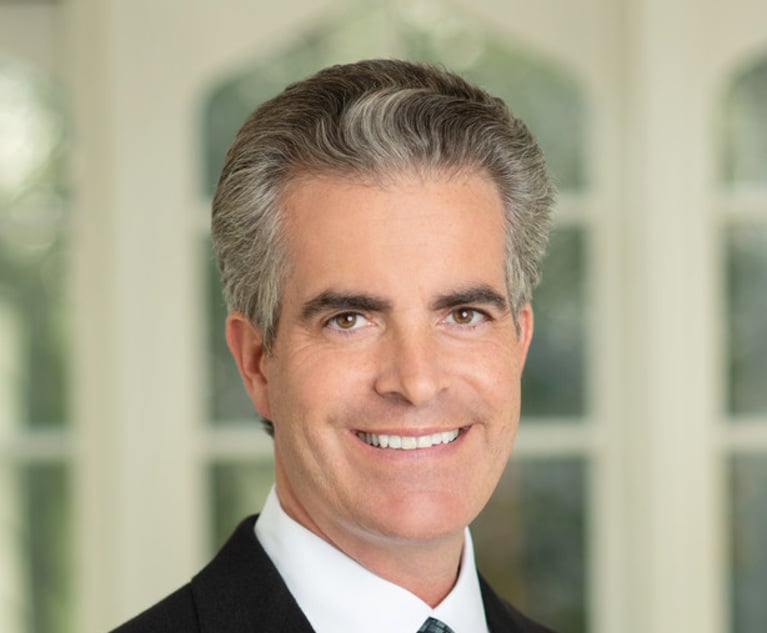Homicide Exoneration May Shed Light on Handling of Appeals Under Krasner
Patterson's case marks the first exoneration in a homicide conviction since District Attorney Larry Krasner took office.
May 16, 2018 at 05:42 PM
5 minute read
 Photo: Shutterstock
Photo: Shutterstock
The case against Dontia Patterson, who spent 11 years in jail for murder, was “weak,” “an abundance” of critical exculpatory evidence was withheld from his defense team, and the defendant “in all likelihood” was innocent, an attorney told the court that weighed Patterson's fate Wednesday.
In a motion filed the day before, that same attorney said Patterson's conviction was “an egregious example of police and prosecutorial misconduct.”
The arguments may seem commonplace from a defense lawyer, but the attorney who uttered those words was Anthony Voci, chief of the homicide unit for the Philadelphia District Attorney's Office, and they could signal how the new administration under District Attorney Larry Krasner plans to handle possible exculpatory evidence during appeals.
“It's a sign of our new DA that this is coming to light,” Philadelphia defense attorney Teri Himebaugh, who focuses on criminal appeals and was not involved in the Patterson case, said.
Patterson's case, which stems from the 2007 murder of Antwine Jackson, marks the first exoneration in a homicide conviction since Krasner took office.
At the time of the shooting Patterson was 17, and prosecutors charged him with first-degree murder. The first trial ended in a hung jury, but he was convicted during a second trial in 2009 and sentenced to life without parole.
In February, after 11 years behind bars, the court granted Patterson a new trial. Although the DA's office agreed that he should be released on electronic monitoring in March, prosecutors did not announce plans to drop the case until Tuesday, when Voci filed a motion seeking to nolle pros the charges.
During the hearing Wednesday addressing that request, Voci said there was no physical evidence or motive linking Patterson to the crime, and that prosecutors failed to tell Patterson's legal team about police reports identifying another suspect in the case.
“You have to follow up with that. You have to get to the bottom of that before you stand in front of a jury,” Voci said.
Patterson was released from electronic monitoring Wednesday, after Philadelphia Court of Common Pleas Judge Kathryn Streeter Lewis granted prosecutors' request to drop the case.
Cozen O'Connor attorney Hayes Hunt, who worked on the team representing Patterson on appeal, said the defense attorneys focused on the evidence pointing to Patterson's innocence, and that it was the prosecutors' office that raised the allegedly withheld evidence, often referred to as Brady material. He also noted that prosecutors had turned over their file in the case—a move he said was also “unprecedented.”
“This motion is extraordinary,” Hunt said after the hearing. “I can't say I've seen a legal pleading from a prosecutor like this.”
According to some criminal defense attorneys, it is rare for prosecutors to introduce Brady material after there has been a conviction, and the hearing Wednesday shows that the office is taking its duty to disclose potentially exculpatory materials more seriously.
“This administration is more willing to disclose that information and to let the chips fall where they may,” Himebaugh said. She added that, although prosecutors must turn over Brady material before trial, there is no legal or ethical obligation to turn over Brady material on appeal.
Himebaugh said the Philadelphia court system is already seeing increased waves of appeals under the Post-Conviction Relief Act, due to recent court rulings and the increased publicity of alleged police misconduct, including a list kept by the DA's office of police officers with credibility concerns. The district attorney's new outlook on Brady, attorneys said, could add to that wave.
“If you turn something over in a case that affects five defendants,” she said.
Himebaugh said prosecutors and the courts are going to need to come up with a way to handle these issues on a broader level. Being able to triage cases to distinguish quickly between meritorious and frivolous appeals is going to be key, she said.
After Lewis granted the DA's request to drop the charges Wednesday, attorneys and audience members, including some of Patterson's family, were excited about the outcome. Several members in the audience stifled tears and prayers of thanks, and Cozen O'Connor managing partner Vincent McGuinness, who was a member of Patterson's defense, said the team was looking forward to working with the newly freed 28-year-old as he re-enters society.
Not everyone, however, was happy about how the DA's office handled the case.
Former homicide prosecutor Richard Sax, who led the second trial against Patterson, said following the hearing that the DA's office did not attempt to speak with him, or the prosecutor who handled the first trial, regarding their understanding of the case. Voci's characterizations of the case's prosecution, he said, were “either blatant lies, half truths, or flat-out wrong.”
“Larry Krasner is absolutely being true to his word on the campaign trail that he was going to empty the jails. Even of guilty people,” Sax said.
Spokesman Ben Waxman said the DA's office would decline to comment beyond what had been said during the court proceedings.
This content has been archived. It is available through our partners, LexisNexis® and Bloomberg Law.
To view this content, please continue to their sites.
Not a Lexis Subscriber?
Subscribe Now
Not a Bloomberg Law Subscriber?
Subscribe Now
NOT FOR REPRINT
© 2024 ALM Global, LLC, All Rights Reserved. Request academic re-use from www.copyright.com. All other uses, submit a request to [email protected]. For more information visit Asset & Logo Licensing.
You Might Like
View All

Pittsburgh Judge Rules Loan Company's Online Arbitration Agreement Unenforceable
3 minute read
Phila. Jury Awards $15M to Woman Who Slipped on Apartment Building Stairs
4 minute read
Pa. Hospital Agrees to $16M Settlement Following High Schooler's Improper Discharge
4 minute readTrending Stories
Who Got The Work
Michael G. Bongiorno, Andrew Scott Dulberg and Elizabeth E. Driscoll from Wilmer Cutler Pickering Hale and Dorr have stepped in to represent Symbotic Inc., an A.I.-enabled technology platform that focuses on increasing supply chain efficiency, and other defendants in a pending shareholder derivative lawsuit. The case, filed Oct. 2 in Massachusetts District Court by the Brown Law Firm on behalf of Stephen Austen, accuses certain officers and directors of misleading investors in regard to Symbotic's potential for margin growth by failing to disclose that the company was not equipped to timely deploy its systems or manage expenses through project delays. The case, assigned to U.S. District Judge Nathaniel M. Gorton, is 1:24-cv-12522, Austen v. Cohen et al.
Who Got The Work
Edmund Polubinski and Marie Killmond of Davis Polk & Wardwell have entered appearances for data platform software development company MongoDB and other defendants in a pending shareholder derivative lawsuit. The action, filed Oct. 7 in New York Southern District Court by the Brown Law Firm, accuses the company's directors and/or officers of falsely expressing confidence in the company’s restructuring of its sales incentive plan and downplaying the severity of decreases in its upfront commitments. The case is 1:24-cv-07594, Roy v. Ittycheria et al.
Who Got The Work
Amy O. Bruchs and Kurt F. Ellison of Michael Best & Friedrich have entered appearances for Epic Systems Corp. in a pending employment discrimination lawsuit. The suit was filed Sept. 7 in Wisconsin Western District Court by Levine Eisberner LLC and Siri & Glimstad on behalf of a project manager who claims that he was wrongfully terminated after applying for a religious exemption to the defendant's COVID-19 vaccine mandate. The case, assigned to U.S. Magistrate Judge Anita Marie Boor, is 3:24-cv-00630, Secker, Nathan v. Epic Systems Corporation.
Who Got The Work
David X. Sullivan, Thomas J. Finn and Gregory A. Hall from McCarter & English have entered appearances for Sunrun Installation Services in a pending civil rights lawsuit. The complaint was filed Sept. 4 in Connecticut District Court by attorney Robert M. Berke on behalf of former employee George Edward Steins, who was arrested and charged with employing an unregistered home improvement salesperson. The complaint alleges that had Sunrun informed the Connecticut Department of Consumer Protection that the plaintiff's employment had ended in 2017 and that he no longer held Sunrun's home improvement contractor license, he would not have been hit with charges, which were dismissed in May 2024. The case, assigned to U.S. District Judge Jeffrey A. Meyer, is 3:24-cv-01423, Steins v. Sunrun, Inc. et al.
Who Got The Work
Greenberg Traurig shareholder Joshua L. Raskin has entered an appearance for boohoo.com UK Ltd. in a pending patent infringement lawsuit. The suit, filed Sept. 3 in Texas Eastern District Court by Rozier Hardt McDonough on behalf of Alto Dynamics, asserts five patents related to an online shopping platform. The case, assigned to U.S. District Judge Rodney Gilstrap, is 2:24-cv-00719, Alto Dynamics, LLC v. boohoo.com UK Limited.
Featured Firms
Law Offices of Gary Martin Hays & Associates, P.C.
(470) 294-1674
Law Offices of Mark E. Salomone
(857) 444-6468
Smith & Hassler
(713) 739-1250





